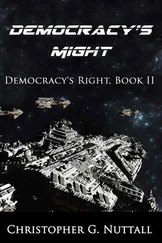Colin rubbed his forehead. “Why?” He asked. “Why was the Empire paying them anything?”
Kathy winced. It had taken several weeks to establish the answer and it wasn’t one she liked. “The Families founded the worlds as colonies and invested heavily in them, both to build up additional industry and to prevent them from paying off their debts and taking their place among the first-rank worlds,” she said. Very few planets had made the leap to first-rank status. The game had been rigged to make that almost impossible. They spent centuries paying off the interest on their debts alone. “They were therefore able to force the combined treasury to fund some of the development, claiming that it was vitally important.”
She shook her head. “There are too many different cases for me to come up with a general rule,” she concluded. “The bottom line is that we don’t have anything like the financial resources we thought we had and that we’re not going to be able to improve the situation anytime soon.”
“Headache now,” Colin said, dryly. Kathy nodded in sympathy. She had spent weeks untangling the complex lines of finance and responsibility that ran through the Empire, only to discover that the Empire had been gravely mismanaged. She couldn’t say that she was surprised, but she couldn’t understand why the Thousand Families had let the situation get so far out of hand. How could they have been ignorant of what they were doing? “Why the hell are we even still paying these… monies?”
“The Empire’s vast bureaucracy kept paying them even though we’d taken over the High City,” Kathy explained, reluctantly. There were literally billions of bureaucrats in the Empire and their combined inertia was incredible. The role hadn’t attracted intelligent and honest men, but unimaginative and outright corrupt men and women. The ones who weren’t skimming themselves bonuses from the top were just carrying out their orders as literally as possible, even if the reason for those orders no longer applied. After all, they might get in trouble if they followed orders, but they would certainly get in trouble if they didn’t follow orders, even if the orders were mistaken.
She shook her head. “In the meantime, the ‘no taxation without representation’ meme seems to have caught on everywhere,” she continued. “We have colonies refusing to pay taxes unless we make one concession or another, or colonies that have seized their infrastructure and demanding that we recognise that before anything else is discussed, or… and the speed of communication doesn’t make it any easy. The knock-on effects are shaking the Empire to pieces, slowly, but very surely.”
Colin winced. “And there I was worried about Admiral Wilhelm,” he said. “How do we tackle this problem?”
“Carefully,” Kathy said. “If we take harsh action, we will only make the situation worse.”
“I think that life was easier if we didn’t care if we broke it or not,” Colin said. Kathy had to agree. They’d fought the Empire, but now they were running the Empire they had to maintain it; it was the basis of their power and legitimacy, such as it was. A mass secessionist movement, or even hundreds of worlds demanding special treatment and rights, would be disastrous, yet anything overt they did to prevent it would be almost as bad. The Empire had created a system for sucking thousands of worlds dry, but the Provisional Government had broken the system and rebuilding it, now, would be impossible. “How do you intend to approach it?”
“First, I intend to limit all further payments,” Kathy said, firmly. “In effect, all parties will have to reapply for them, which will give us a chance to see what is actually needed and what is merely… someone attempting to exploit us. They’ll have to present their case here, at the High City, and we can judge them on a case-by-case basis.
“Second, I propose to legalise the seizure of the industries,” she continued. “It won’t go down well with the remains of the Families, but unless we’re prepared to use military force to retake and run them, we can’t recover them anyway. That will allow them to be brought back into the Empire’s overall industrial potential and, just incidentally, push them into producing small craft for their own defence.”
Colin frowned. “A case could be made that that was a breech of the surrender agreement,” he pointed out. “Do you really feel that that it necessary?”
“We don’t have many options,” Kathy said, grimly. “The Thousand Families may have built and exploited the industries, but it wasn’t the Families who ran them. They preferred to leave that to massive workforces who were paid very little and treated with extreme brutality if they attempted to unionise. Now, they’re seizing the workplaces with the concurrence of local authorities and… we can’t do anything about it. We may as well accept it.”
“Tiberius will definitely not be happy,” Colin said. Kathy nodded, but held her ground. “Very well. And the third?”
“I intend to put out as many contracts as possible to the new firms and companies,” Kathy concluded. “They will be paying taxes to the Empire, if they succeed, and I intend to force them into proper competition. The Thousand Families used to keep the shipping lines sewn up as tight as possible, but now there will be others, including the Freebooters.”
Colin smiled. “Daria will be happy about that,” he said. “Recognition at last.”
Kathy nodded. She rather like Daria, although she had the odd nagging feeling that she’d known Daria some time before, even though she had never seen her in her life before she’d been transported to Patrick’s Asteroid. The Freebooters had been pushing their way into areas once dominated by the Family-owned shipping lines, aided and abetted by starship crews deserting the Families and signing up with the Freebooters, and prices were falling everywhere. If the pirates could be beaten — and very few pirates would dare to tangle with the Freebooters — the Empire might be on the verge of an economic renaissance, if they could hold out long enough.
“Yes,” she agreed. “I think that if we hang on and stanch most of the bleeding, we should be able to save the Empire from complete collapse. The worst problem, however, is that we may no longer be able to afford the starship construction program.”
“We can’t lower our guard, not now,” Colin said, slowly. “Admiral Wilhelm alone is a serious problem, Kathy, and there are rumours of other warlords out along the Rim.”
“I know,” Kathy said. “The figures, however, don’t lie. If we carry on the current construction program, we will be unable to continue it past four months, unless something changes radically. The Empire never produced many superdreadnaughts for precisely that reason. If you think about it” — she was vaguely aware that she was teaching her grandmother to suck eggs — “the Imperial Navy should have been several times its pre-war size, but…”
“I’ll think about it,” Colin promised, holding up a hand. “Now, have you considered my proposals for the future government of the Empire?”
Kathy nodded. Colin had proposed, with support from most of his inner circle, a federal structure, devolving local autonomy down on every inhabited world, provided they honoured the Empire’s control over interstellar affairs. The rule of law, as Colin had explained it, would govern the Empire. There would no longer be massive abuses of power by the Thousand Families, or even Parliament itself.
“I only have one concern,” Kathy said. “We need to make it clear that Imperial Law governs all commercial activity. Far too many of our current problems stem from planets and governments refusing to pay their debts, rightly or wrongly, and we cannot allow that to continue. We will have to be prepared to sanction anyone who breaks interstellar law.”
Читать дальше












